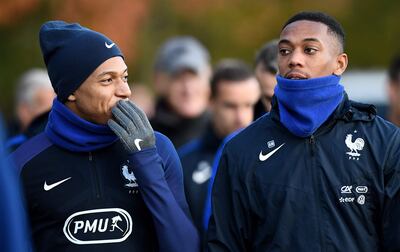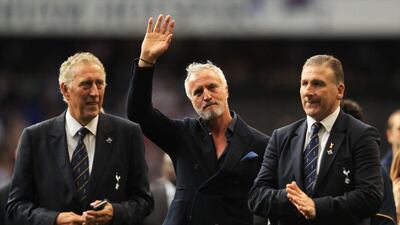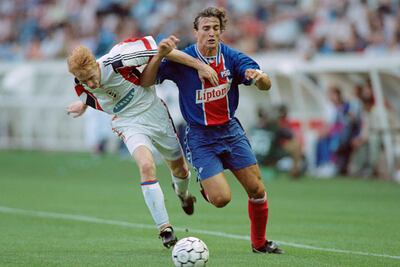“It was a beautiful day in May 2016 and I was playing a charity football game in the south of France,” recalls the former Paris Saint-Germain, Newcastle United, Tottenham Hotspur and France winger David Ginola, 50.
“In the second half, when I was going back to my half, I fell on the floor and was unconscious. I started to swallow my tongue and my friends on the pitch called the emergency services. They explained the situation and were told what to do, which was forget about the tongue and concentrate on the heart. I was lucky that some of my friends knew how to perform a CPR [cardiopulmonary resuscitation].”
For the next nine minutes, Ginola’s friends took it in turns to dig into his ribs towards his heart.
“I was actually dead,” explains the only player to be crowned Footballer of the Year in both France and England. “My heart had stopped. They kept expecting something, but nothing happened until the emergency services arrived. They shocked me once, twice. They actually shocked me five times before they got a response from my heart using a defibrillator.”
Ginola was flown by helicopter to a hospital in Monaco and underwent an operation lasting six hours.
“Surgeons made a quadruple bypass on my heart,” explains Ginola. “My heart stopped a second time. I had died again.”
Ginola had felt no previous symptoms.
“Normally when you have a cardiac arrest, you have a pain in your heart. You feel pressure on your chest. I didn’t feel anything. I just went on the floor and then woke up in hospital. I can’t say that I was in any pain. I can’t even say that my life flashed before me. It’s a shame that I didn’t get to relive all those wonderful moments! When I woke up, the doctor said: ‘Do you know where we are?’ He was concerned about my brain and he asked me questions about where we were, about if I’d remembered anything that had happened to me. I had not. The doctor told me to look at my chest and I look down to see plasters and tubes coming out. I asked him if it was pretty heavy and he said that it was.”
Ginola, who also represented Toulon, Aston Villa and Everton in a 17-year playing career, was talking last week at the Lisbon Web Summit and was keen to offer some statistics.
“Twenty thousand people die while doing sport in Europe each year,” he said. “We can all be victims of a cardiac arrest, but the survival rate is five per cent. There are eight million fatalities every year, the second biggest cause of death in the world after cancer. Sport has a duty to raise awareness in the general public.”
Ginola was lucky to survive. The ambulance was not equipped with GPS, but by chance the paramedic had been to the venue earlier in the day. Someone was there who knew how to do CPR, although because Ginola had joked that he was going to fall over to win a penalty, some players initially thought he was spoofing.
Ginola is now in good health and enjoying football. He still watches plenty of matches in his role as a television analyst. A sublime playing career was rewarded with only 17 French caps, so how does he view Didier Deschamps' current squad?
“I covered 11 games in Euro 2016. Many of them were France. What is exciting about the current team is the change in mentality since 2010, when the players went on strike. Men earning millions on strike. How did the miners feel about these players going on strike, the normal workers? If you play for France then it should not be for money, but the pride of wearing the national jersey, not the bonuses and the sponsors," he says.
“Now their priority seems to be wearing the national jersey, like I see in other counties. I see other players crying when they hear the national anthem, but in France there was a weird comprehension of why players didn’t seem so concerned about wearing the national shirt. When I was young my goal was to wear the shirt of France, to play for my country with the little cockerel on my chest.
“We’re quite controversial about everything national in France. We’re not that proud of being French compared to other countries. When England’s national team play you see St George flags in the houses and the cars. In France, for years the national flag meant you were a nationalist, even if you were just patriotic. I think France is reclaiming the flag again, but we are also very patriotic when we are winning!”
_______________________
Read more from Andy Mitten:
- David Ginola on beating Manchester United 5-0 and Keegan 'getting out of his mind'
- Eric Bailly exclusive: Ivorian defender 'happy to be back playing' for Manchester United
- Oldham manager Richie Wellens the latest beneficiary of former mentor Alex Ferguson's sage advice
- How Manchester United and Eric Cantona benefited from deal struck by Martin Edwards
_______________________
Ginola is optimistic.
“France has the ability to do well in Russia. When they reached the final against Portugal last year there was a lack of inspiration and maturity, plus experience of playing in a final. Players learn from their mistakes, they’re getting more mature and stronger mentally.”
Players like Anthony Martial.
“Anthony is amazing, but when you sign for such a big club like Manchester United there is so much pressure,” something which Ginola knows all about.
“Footballers are not robots. You have the press on your shoulder all the time asking questions. If you don't score in a few games there are problems. It’s hard for a young man who is yet to mature. I was a baby at that age, yet the younger players seem to be more mature now. Mentally and physically, they look like they’re older, but 99 per cent of being a footballer is in your mind.”

Ginola’s mind has been focused after his heart attack, and he wants to spread his message to save lives so that others can be as fortunate as he was.
“I want more people to be able to save lives and know how to do CPR,” he says. “Kids should be learning how to do it – it takes an hour to learn. One person in each family who knows how to do CPR, people with a history of heart problems should have a check up. My mother died of a heart attack; my father needed four heart operations.”
He knows that most heart attacks happen at home, at night, with loved ones present. They are often struck by panic and don’t know what to do.
“Sadly, the survival rate for cardiac arrest is not increasing,” Ginola says, “and the victim loses 10 per cent chance of survival every minute they are not seen to.”
Ginola hopes to use technology to optimise the management of emergencies. His idea was nodds.com, a free system where GPS will be used to help get the fastest response, be it by locating the nearest defibrillator or the nearest person who is registered to perform CPR. The app is expected to be available in early 2018.
“After my accident I asked myself so many questions,” he says. “As well as CPR, it’s vital that we stop managing emergencies with tools from the last century. We’re all supposed to be connected on social media, but are we really connected if someone has a cardiac arrest?”



